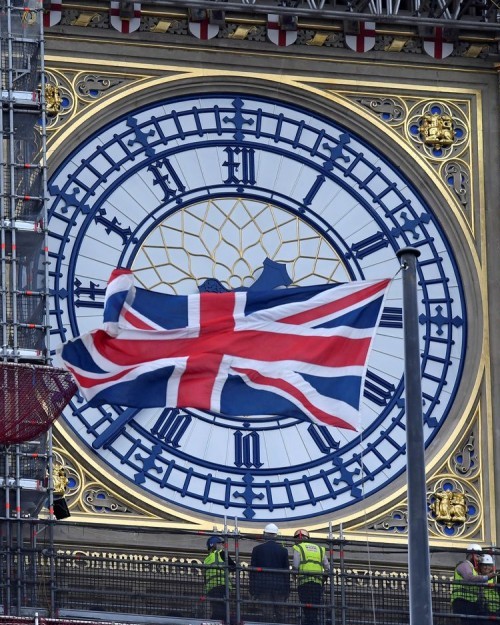|
[Majorityrights Central] A British woman in Ukraine and an observer of Putin’s war Posted by Guessedworker on Monday, 14 April 2025 00:04. [Majorityrights News] France24 puts an end to Moscow’s lie about the attack on Kryvyi Riy Posted by Guessedworker on Monday, 07 April 2025 17:02. [Majorityrights News] If this is an inflection point Posted by Guessedworker on Thursday, 03 April 2025 05:10. [Majorityrights News] Sikorski on point Posted by Guessedworker on Friday, 28 March 2025 18:08. [Majorityrights Central] Piece by peace Posted by Guessedworker on Wednesday, 19 March 2025 08:46. [Majorityrights News] Shame in the Oval Office Posted by Guessedworker on Saturday, 01 March 2025 00:23. [Majorityrights News] A father and a just cause Posted by Guessedworker on Tuesday, 25 February 2025 23:21. [Majorityrights Central] Into the authoritarian future Posted by Guessedworker on Friday, 21 February 2025 12:51. [Majorityrights Central] On an image now lost: Part 2 Posted by Guessedworker on Saturday, 15 February 2025 14:21. [Majorityrights News] Richard Williamson, 8th March 1940 - 29th January 2025 Posted by Guessedworker on Monday, 03 February 2025 10:30. [Majorityrights Central] Freedom’s actualisation and a debased coin: Part 2 Posted by Guessedworker on Saturday, 11 January 2025 01:08. [Majorityrights News] KP interview with James Gilmore, former diplomat and insider from first Trump administration Posted by Guessedworker on Sunday, 05 January 2025 00:35. [Majorityrights Central] Aletheia shakes free her golden locks at The Telegraph Posted by Guessedworker on Saturday, 04 January 2025 23:06. [Majorityrights News] Former Putin economic advisor on Putin’s global strategy Posted by Guessedworker on Monday, 30 December 2024 15:40. [Majorityrights News] Trump will ‘arm Ukraine to the teeth’ if Putin won’t negotiate ceasefire Posted by Guessedworker on Tuesday, 12 November 2024 16:20. [Majorityrights News] Olukemi Olufunto Adegoke Badenoch wins Tory leadership election Posted by Guessedworker on Saturday, 02 November 2024 22:56. [Majorityrights News] What can the Ukrainian ammo storage hits achieve? Posted by Guessedworker on Saturday, 21 September 2024 22:55. [Majorityrights Central] An Ancient Race In The Myths Of Time Posted by James Bowery on Wednesday, 21 August 2024 15:26. [Majorityrights Central] Slaying The Dragon Posted by James Bowery on Monday, 05 August 2024 15:32. [Majorityrights Central] The legacy of Southport Posted by Guessedworker on Friday, 02 August 2024 07:34. [Majorityrights News] Farage only goes down on one knee. Posted by Guessedworker on Saturday, 29 June 2024 06:55. [Majorityrights News] An educated Russian man in the street says his piece Posted by Guessedworker on Wednesday, 19 June 2024 17:27. [Majorityrights Central] Freedom’s actualisation and a debased coin: Part 1 Posted by Guessedworker on Friday, 07 June 2024 10:53. [Majorityrights News] Computer say no Posted by Guessedworker on Thursday, 09 May 2024 15:17. [Majorityrights News] Be it enacted by the people of the state of Oklahoma Posted by Guessedworker on Saturday, 27 April 2024 09:35. [Majorityrights Central] Ukraine, Israel, Taiwan … defend or desert Posted by Guessedworker on Sunday, 14 April 2024 10:34. [Majorityrights News] Moscow’s Bataclan Posted by Guessedworker on Friday, 22 March 2024 22:22. [Majorityrights News] Soren Renner Is Dead Posted by James Bowery on Thursday, 21 March 2024 13:50. [Majorityrights News] Collett sets the record straight Posted by Guessedworker on Thursday, 14 March 2024 17:41. [Majorityrights Central] Patriotic Alternative given the black spot Posted by Guessedworker on Thursday, 14 March 2024 17:14. [Majorityrights Central] On Spengler and the inevitable Posted by Guessedworker on Wednesday, 21 February 2024 17:33. [Majorityrights News] Alex Navalny, born 4th June, 1976; died at Yamalo-Nenets penitentiary 16th February, 2024 Posted by Guessedworker on Friday, 16 February 2024 23:43. [Majorityrights News] A Polish analysis of Moscow’s real geopolitical interests and intent Posted by Guessedworker on Tuesday, 06 February 2024 16:36. [Majorityrights Central] Things reactionaries get wrong about geopolitics and globalism Posted by Guessedworker on Wednesday, 24 January 2024 10:49. Majorityrights News > Category: Activism Should take his own advice. Should take his own advice.
 Laura, a solid English ethnonationalist Laura, a solid English ethnonationalistIf you insert the word “international” for them, before the term “left”, you do them the favor of undoing their unwitting complicity with Jewish interests; though in Greg’s case, he perhaps cannot help it, as doubling down saves him from the criticism and bad news that he claims his elitism should hear. Otherwise, some good thoughts in that conversation. Criticisms of Johson’s elitism, for example: In his conversation with Morgoth just prior to this one with Laura, he calls the Scottish Nationalist Party the “perfect example of left nationalism.” Is it really so hard for you to do something like put the word international before the term left?, Greg, or do you insist upon an oxymoron like internationalizing nationalism, which is what you are talking about with The SNP? Also in this discussion, he wants to contrast aesthetics to counter the avarice of sheer mercantile utilitarianism. I endorse the essence of the project he’s after, that is, countering radical liberalizing effects of mercantile hegemony… But the concept of usefulness is not the opposite of the importance of aesthetics. Aesthetics play important, useful functions for people. And paying attention to what is useful is an under utilized, liberating suggestion in service of orienting the popular understanding and deployment of philosophy. Hence, Greg’s superficial suggestion of aesthetics over utilitarianism just to play opposite day with me is a bum steer. I guess that snooty right wing elitism is a comfy perch for Greg. Related at Majorityrights: Elitism, secrecy, deception … the way to save white America?
On Bitchute:
“Enjoy The Moment” - Mancinblack  A Union Jack flag flutters in front of Big Ben as workers inspect one of its clocks, in London on Sept 11. (Reuters photo) A Union Jack flag flutters in front of Big Ben as workers inspect one of its clocks, in London on Sept 11. (Reuters photo)
Finding issues of coordination & coalition when differences in worldview can be put off indefinitely
Virginia Second Amendment Movement - Lobby & Rally for Gun Rights! “We Can Change The World!”
...followed by pledge of allegiance by gun rights protesters in Richmond.
At Luke Ford Live Stream #404 1-16-20, min. 1:59:15. Kevin Michael Grace comments on a Paul Kersey story (below story from Unz and V-Dare): KMG’s comments are helpful because he adds some clues about the relevant parties under discussion, which Kersey, being in the Jarod Taylor camp, would shy away from. We can then in turn, add the brackets.
Page 15 of 99 | First Page | Previous Page | [ 13 ] [ 14 ] [ 15 ] [ 16 ] [ 17 ] | Next Page | Last Page |
|

Existential IssuesDNA NationsCategoriesContributorsEach author's name links to a list of all articles posted by the writer. LinksEndorsement not implied. Immigration
Islamist Threat
Anti-white Media Networks Audio/Video
Crime
Economics
Education General
Historical Re-Evaluation Controlled Opposition
Nationalist Political Parties
Science Europeans in Africa
Of Note MR Central & News— CENTRAL— Piece by peace by Guessedworker on Wednesday, 19 March 2025 08:46. (View) Into the authoritarian future by Guessedworker on Friday, 21 February 2025 12:51. (View) On an image now lost: Part 2 by Guessedworker on Saturday, 15 February 2025 14:21. (View) — NEWS — If this is an inflection point by Guessedworker on Thursday, 03 April 2025 05:10. (View) Sikorski on point by Guessedworker on Friday, 28 March 2025 18:08. (View) Shame in the Oval Office by Guessedworker on Saturday, 01 March 2025 00:23. (View) A father and a just cause by Guessedworker on Tuesday, 25 February 2025 23:21. (View) CommentsManc commented in entry 'Piece by peace' on Wed, 19 Mar 2025 14:20. (View) Thorn commented in entry 'Piece by peace' on Wed, 19 Mar 2025 14:13. (View) Guessedworker commented in entry 'Piece by peace' on Wed, 19 Mar 2025 13:54. (View) Thorn commented in entry 'A father and a just cause' on Mon, 10 Mar 2025 18:43. (View) Thorn commented in entry 'A father and a just cause' on Sun, 09 Mar 2025 14:47. (View) Manc commented in entry 'A father and a just cause' on Sun, 09 Mar 2025 13:55. (View) Thorn commented in entry 'A father and a just cause' on Sat, 08 Mar 2025 23:56. (View) Guessedworker commented in entry 'A father and a just cause' on Sat, 08 Mar 2025 22:09. (View) Thorn commented in entry 'A father and a just cause' on Sat, 08 Mar 2025 20:53. (View) Thorn commented in entry 'A father and a just cause' on Sat, 08 Mar 2025 20:37. (View) Manc commented in entry 'A father and a just cause' on Sat, 08 Mar 2025 20:22. (View) Guessedworker commented in entry 'A father and a just cause' on Sat, 08 Mar 2025 18:32. (View) Thorn commented in entry 'A father and a just cause' on Sat, 08 Mar 2025 16:07. (View) Guessedworker commented in entry 'A father and a just cause' on Sat, 08 Mar 2025 15:18. (View) Thorn commented in entry 'A father and a just cause' on Sat, 08 Mar 2025 12:15. (View) Thorn commented in entry 'A father and a just cause' on Fri, 07 Mar 2025 16:33. (View) Guessedworker commented in entry 'A father and a just cause' on Fri, 07 Mar 2025 13:45. (View) Thorn commented in entry 'A father and a just cause' on Fri, 07 Mar 2025 12:12. (View) Thorn commented in entry 'A father and a just cause' on Fri, 07 Mar 2025 11:31. (View) Guessedworker commented in entry 'A father and a just cause' on Fri, 07 Mar 2025 08:21. (View) Thorn commented in entry 'A father and a just cause' on Fri, 07 Mar 2025 00:20. (View) Guessedworker commented in entry 'A father and a just cause' on Thu, 06 Mar 2025 23:38. (View) Thorn commented in entry 'A father and a just cause' on Thu, 06 Mar 2025 21:33. (View) Thorn commented in entry 'Into the authoritarian future' on Wed, 05 Mar 2025 23:00. (View) Guessedworker commented in entry 'Into the authoritarian future' on Wed, 05 Mar 2025 16:55. (View) Thorn commented in entry 'Into the authoritarian future' on Wed, 05 Mar 2025 00:15. (View) Thorn commented in entry 'Into the authoritarian future' on Tue, 04 Mar 2025 23:55. (View) Thorn commented in entry 'Into the authoritarian future' on Tue, 04 Mar 2025 23:47. (View) Guessedworker commented in entry 'Into the authoritarian future' on Tue, 04 Mar 2025 22:59. (View) Thorn commented in entry 'Into the authoritarian future' on Tue, 04 Mar 2025 20:28. (View) Thorn commented in entry 'Into the authoritarian future' on Tue, 04 Mar 2025 19:21. (View) Guessedworker commented in entry 'Into the authoritarian future' on Tue, 04 Mar 2025 17:23. (View) Thorn commented in entry 'Into the authoritarian future' on Tue, 04 Mar 2025 15:09. (View) Guessedworker commented in entry 'Into the authoritarian future' on Tue, 04 Mar 2025 14:55. (View) Thorn commented in entry 'Into the authoritarian future' on Tue, 04 Mar 2025 14:53. (View)  
|